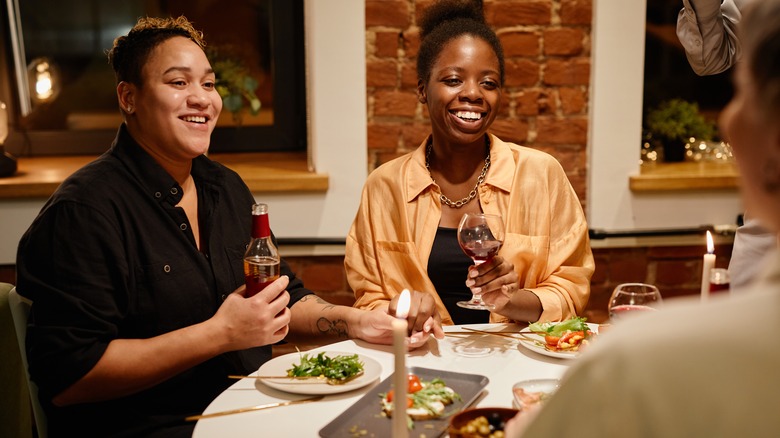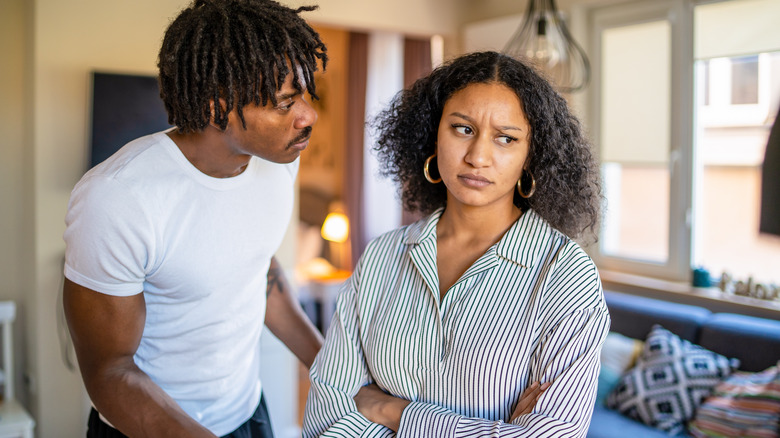Is Jealousy In A Relationship Ever Healthy? A Therapist Tells It To Us Straight
Jealousy is part of the human condition. Whether we experience it in our friendships, relationships, or in the workplace, to feel jealous isn't uncommon. It's a matter of what someone else has that we do not and how that perceived inadequacy affects us. For some, that jealousy can spiral into rage and resentment, while for others it can spark a bit of healthy competition. In other words, there's no one way to experience jealousy, nor is their one way to respond to it.
But in romantic relationships, jealousy gets a bad rap. So much so that no one ever wants to admit that they're jealous. "Jealousy itself is not healthy or unhealthy," relationship coach Joli Hamilton, Ph.D. tells Elite Daily. "Though the [American Psychological Association] continues to define jealousy as a 'negative emotion,' we can work with jealousy much more effectively if we see it like other big emotions — anger and sadness. Any of these big emotions can feel overwhelming, but they are also normal, natural, and most importantly, temporary."
When we're in love, the chemicals in our brain distort how we see and interpret things, making jealousy a difficult emotion to navigate. Research has found time and again that being in love affects us the same way that drug addiction does, so naturally, it can alter our behavior when we see something that might threat what we have with our partner. Because the healthiness of jealousy in a relationship is so nuanced, we reached out to licensed therapist and founder of The Truth Doctor Dr. Courtney Tracy who, in an exclusive chat with Women, set us straight on the matter.
Jealousy can be a sign you value your relationship
If you've ever felt jealousy in your relationship, not only are you not alone, you're also in the majority. According to a 2017 study published in Psychiatry and Clinical Psychopharmacology, a whopping 79% of males and 66% of females report having felt jealous in their relationship. Big numbers, yes, but also very much indicative of just how prevalent it is.
"Jealousy is a common (and expected) human emotion," Dr. Tracy exclusively tells Women. "The presence of healthy jealousy — a mild, transient emotion that comes from a place of genuine care and connection rather than insecurity or possessiveness— can be a good thing."
As Dr. Tracy explains, experiencing these feelings means you value your relationship. When we value something, we don't take it for granted. Instead, we want to strengthen it, protect it, and take the necessary steps to foster and nurture it. In doing this, our partner knows that they're appreciated, and who they are and what they do is important to us and our life. It's this belief and mindset that makes for a long-lasting relationship. In that regard, jealousy isn't just healthy, but paramount.
Healthy jealousy is all about how you react to it
It's important to understand that what constitutes healthy jealousy looks different to every couple. This becomes even more true when you take into account that not everyone experiences jealousy. (Lucky them, right?) But it's important to remember it's not the thing you're jealous of that determines whether or not it's healthy — it's how you deal with and express your feelings about it.
For example, let's say you're out with your partner and the bartender starts giving them some extra flirty attention, causing you to feel a sudden a pang of protectiveness. If you're truly confident in yourself and your partner's commitment to you and your relationship, your internal response will be an affirmation of how you're attracted to and value your partner, Dr. Courtney Tracy exclusively tells Women. That's handling jealousy in a healthy manner.
On the flip side, if you're not confident in your relationship, "you'll likely feel uncomfortable jealousy that feels destabilizing." If you let yourself marinate in that discomfort, there's a good chance you'll find yourself seething, spiraling, and even enraged. When that happens, it can feel difficult to come back down to your center and get control of your feelings. It's here where things can get problematic.
But it can easily become unhealthy
If we think of jealousy as a neutral emotion that we can manipulate once it grabs a hold of us, then we can have a better understanding of how and why it can go in the wrong direction. Dr. Courtney Tracy says there is technically no line between harmless and harmful jealousy, it's how you're able to handle it when it pops up. "If it's a passing feeling that doesn't lead to negative behaviors, it's likely healthy and harmless," they add.
But the problem is that some people, either because of their own insecurities or the particulars of a certain situation, can't let go. For them, the feeling doesn't pass because it's rooted in something that has triggered a negative response. "When [jealousy] leads to constant questioning, distrust, or controlling behavior, there's something far deeper than just a jealousy problem going on," Dr. Tracy explains to us. It's at this point, that the person experiencing the jealousy needs to dig around and unpack the details because it's no longer about what's happening in that moment.
How to stay ahead of unhealthy jealousy
While jealousy in all its forms can't necessarily be erased, it can be contained and managed. And, to no surprise, the best way to do that in a relationship is through communication. When we openly and honestly communicate with our partner about what's bothering us — jealousy and otherwise — we're not just informing them of what's going on in our head, but we're getting their feedback on those thoughts and feelings. Sharing that your jealousy has been triggered gives your partner the opportunity to hear your concerns and reassure you that those concerns, while valid, aren't necessary.
Relationships aren't easy. They take a lot of work and much of that includes being proactive and having a plan for how to deal with situations when they arise. Especially where jealousy might be involved. "We can prevent destructive jealousy with open communication, acts of love and connection, and self-assurance that we know what we deserve and how to spot if we've got it or not," licensed therapist and founder of The Truth Doctor Dr. Courtney Tracy exclusively tells Women.
If you or your partner experience jealousy at moments in your relationship, be kind to yourselves and each other about it. As long as you're both able to regulate your emotions so the jealousy doesn't become an issue, then that's what really matters. It may take practice in both understanding and instinctively responding, but we are bigger than the jealousy that comes into our lives. We control it; it doesn't control us. So, let's not give it any power.




